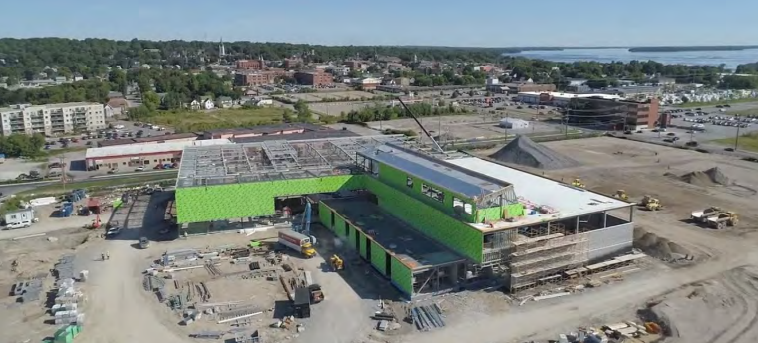A proposed solar panel project on the roof of the city’s new recreation centre may not see the light of day after all.
On Monday, council committee voted not to proceed with a citizen-led initiative to install a massive solar panel project atop the facility being built on West Street.
Kent Guptill, Orillia's director of facilities and special projects, told councillors staff does not support the project because there are no rebate programs being offered that would allow it to be financially viable.
In April, a grass-roots citizens group calling themselves Orillia Community Energy (OCE) made a pitch to council to develop a 150-kilowatt solar installation on the 11,000-square-foot, flat roof of the building under construction on West Street.
Guptill noted the building has been designed “to accommodate a future solar panel project” and he applauded the “good work” of OCE.
He noted the cost of the solar panel project is estimated to be $300,000. OCE proposes to raise two-thirds of that cost from the public and private sectors. The city is being asked to ante up the remainder - $30,000 annually for three years.
Guptill also noted Orillia Power confirmed OCE’s estimate that the annual operating costs of about $18,000 would be negated by the savings of using solar energy versus electricity.
Coun. Tim Lauer urged his fellow councillors to work with him to create a solution rather than nix the project.
The long-time Ward 4 councillor noted the citizens behind the project have “made a pretty good effort. I’d like to see us try to push this forward.”
Lauer said the city should step up to provide “seed money for this community fundraising effort.”
It’s not all about dollars and cents, he stressed.
“I realize some of the numbers are not making sense in terms of the return,” noted Lauer, but he reminded his colleagues that OCE also wanted to use the project as an educational tool to promote conservation.
He said the group planned to “put an installation in the facility that would reflect what’s going on on the roof” as part of an interactive, educational tool.
“I’d hate to just let this die at this point,” said Lauer.
But staff noted the project could proceed “very quickly” in the future if a rebate program becomes available.
Coun. Ted Emond said it’s “premature” to forge ahead with the ambitious rooftop project.
He noted the Mayor’s Task Force on Sustainability has been actively developing ideas to combat climate change and tackle other issues.
“They have identified 35 other items,” said Emond, noting the committee has not yet prioritized those nor presented them to council. However, “almost all will require some investment” - likely from the city.
“My view is, why let this one jump the queue?” he said of the solar project. “It’s a possibility at any time in the future that this may be a project that makes sense for us, but there may be others,” said the second-term Ward 1 councillor.
He noted city staff are also in the midst of developing a “sustainability program for our city” that will require municipal funding.
“I just think it’s premature,” Emond said of providing funding to the solar project. “We need to consider (requests) in a more balanced fashion.”
Most of his colleagues agreed and voted not to proceed with the project at this time. Coun. Jay Fallis and Lauer voted against the decision.
The decision is subject to ratification at Thursday’s council meeting.
OTHER SOLAR PROJECTS IN ORILLIA
The city leases three building rooftops to the Orillia Power Distribution Corporation (OPDC) for solar panel projects. Those are at Rotary Place, 2 Hunter Valley Road (Nordia) and the Barnfield Point Recreation Centre.
The total energy output of those installations is approximately 850,000 kilowatt hours.
The city receives a percentage of the annual rebate that OPDC receives from the provincial government based on the local utility’s Feed-in Tariff (FIT) program rebate agreement.
The average total amount the city receives annually is $30,000.
The FIT program was vital in OPDC’s decision to purchase and install their solar panel projects. The program was aimed at stimulating growth in the alternative energy sectors.
Under this rebate agreement, OPDC sold the energy generated to the provincial government for a contracted price per kWh for 20 years.
The FIT program contract provided an incentive that was large enough to create a viable return on investment for companies like OPDC to move forward with their projects.
The FIT program is no longer available for new installations, and OPDC has indicated there are currently no replacement program opportunities for solar panel projects being offered by the provincial government.
The loss of that subsidy makes solar panel projects less favourable financially.
